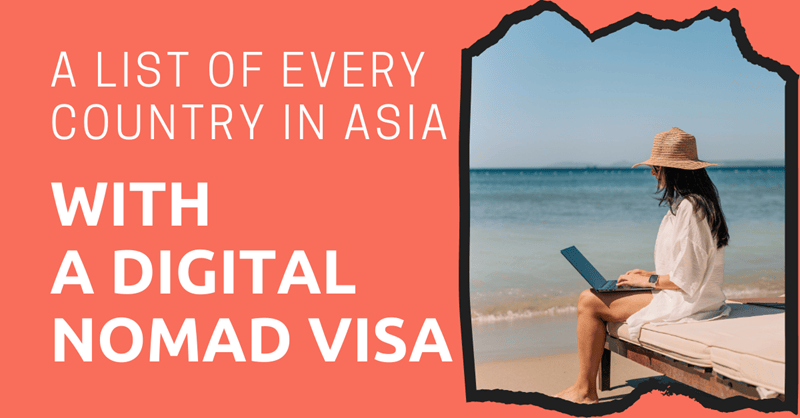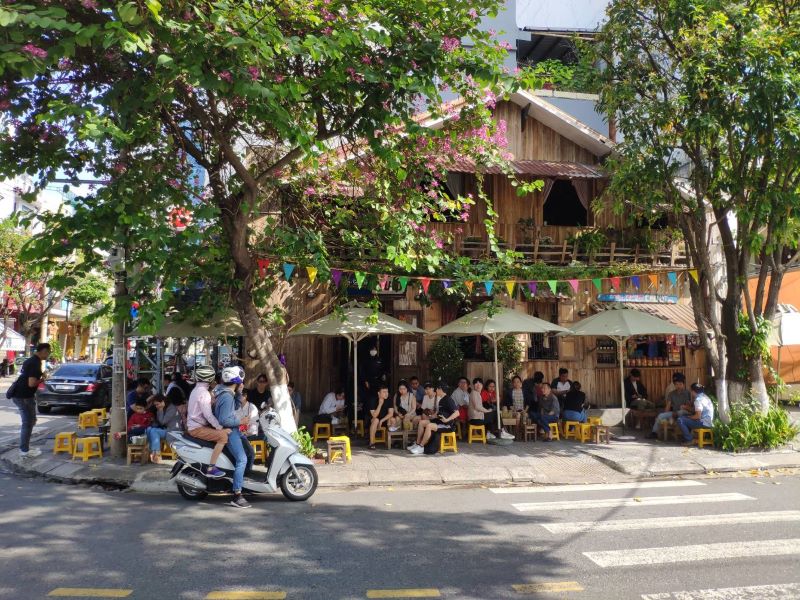
Asia can be quite an attractive continent for digital nomads.
Along with the sheer variety of countries, climates, and cultures, there are some very appealing visa schemes in place that cover all kinds of digital nomad jobs.
In this article, we will look at some of the best countries in Asia for digital nomads. Some offer explicit digital nomad visas, while others have long-stay visa schemes that apply to digital nomads.
This article will take approximately 14 minutes to read. Don't have the time right now? No worries. You can email the ad-free version of the article to yourself and read it later!
Disclaimer: This article may include links to products or services offered by ExpatDen’s partners, which give us commissions when you click on them. Although this may influence how they appear in the text, we only recommend solutions that we would use in your situation. Read more in our Advertising Disclosure.
Contents
Countries with a Digital Nomad Visa in Asia
There currently aren’t many countries in Asia that offer specific visas for digital nomads. It’s a fairly new concept, so these visas aren’t very common anywhere in the world.
Some countries might be popular destinations for digital nomads, such as Thailand and Indonesia, but they do not have specific visas for digital nomads yet.
While there are quite a few Asian countries planning digital nomad visas, we haven’t included them here because there isn’t much reliable information available.
In this section, we will cover all the known countries in Asia so far that have a visa for digital nomads.
Malaysia
Main Requirements: an annual income of $24,000 US and a minimum 3-month contract from any company you are working for
Duration of Stay: upto 2 years
Malaysia offers a digital nomad visa called the DE Rantau program.
It was launched by the Ministry of Digital in October 2022 specifically to attract foreign online workers to the country. It’s open to all nationalities and has fairly easy application requirements.
It grants you a visa of 3-12 months with the ability to extend it up to a total of 24 months and allows you to live and work anywhere you want in Malaysia.
Along with the usual documents (passport, payslip, etc.), you need:
- evidence of an annual income of $24,000 US
- evidence of a minimum 3-month contract from any company you are working with for the time you’re in Malaysia.
As part of the application, you’ll also need to register with Malaysia’s Inland Revenue and get yourself medical insurance.
The fee is around $210 for the applicant, and you can also bring dependents with you for $105 each.
In addition the government has established DE Rantau hubs – well-located apartment buildings with all the facilities a digital nomad might need.
There are currently 4 locations: Kuala Lumpur, Melaka, Penang, and Kedah. This will give applicants plenty of variety in terms of culture, location, and climate.
Overall, Malaysia’s DE Rantau visa is a pretty good option for digital nomads. The key takeaways are:
- Fairly relaxed application requirements
- Ability to extend it up to 2 years in total
- Achievable earning requirements for most digital nomads
Malaysia has a great combination of factors that make it suitable for digital nomads. It has highly developed infrastructure and a high, yet inexpensive, quality of living.
Of course, the amazing food and climate help too.
Japan
Main Requirements: an annual income of $68,000 US. Only available to citizens from countries with both visa exemption agreement and double taxation agreement with Japan only.
Duration of Stay: maximum 6 months
Japan’s digital nomad visa is very new – it launches in March 2024. As such, the requirements are fairly strict, but this might change in the future as the country works out the most suitable options.

The first thing to know is that the visa is only for people from 49 countries. This includes countries in the European Union (EU), the United States, Canada, Australia, and New Zealand.
Specifically, this is any country that has both a visa exemption and a double taxation agreement. Check the links to see if your country is on both lists to see if you’re eligible.
Next is the length of stay. Currently set at 6 months, it’s double the length of stay allowed under visa-free travel.
However, compared to Malaysia, it’s a bit short. For those who want a taste of Japan, though, it should be plenty.
Finally, we have the earning requirements. You must be an employee or owner of a business, or a freelancer, registered outside of Japan.
What’s more, you must have an annual income of at least $68,000 US, which will probably prevent quite a lot of people from applying.
It’s likely this limit was chosen because of Japan’s high cost of living, but also to encourage high earners to contribute to the economy. We might see the earning requirement come down in the future, but it’s unlikely.
Although Japan’s nomad visa is still quite fresh, we might see some adjustments in the future based on its popularity. For now, though, the important points are:
- Earning requirements are quite high
- Provided you meet the entry requirements, the application will probably be quite easy
- There’s plenty of flexibility in the types of jobs you can do
What needs to be said about Japan’s appeal as a destination for digital nomads?
The combination of traditional culture and futuristic infrastructure isn’t something you’ll find everywhere. Add in the great food and beautiful scenery, and you’ve got a great option for remote working.
South Korea
Main Requirements: annual income of US$66,000
Duration of Stay: upto 2 years
South Korea’s digital nomad visa is again quite new – it launched in January 2024. It covers digital nomads who work for non-Korean companies, along with the applicant’s spouse and children. Provided you’re over 18 and have worked in the same industry for at least a year, you’re pretty much eligible.
The only other thing you need is the minimum income requirements, which are currently $66,000 US. However, it’s specifically double Korea’s gross national income per capita in the previous financial year, so expect this to change slightly each year.
The visa covers you for an initial year and can be extended by another 12 months. A total of 2 years is fairly reasonable for a digital nomad visa, and we may see options to extend it further in the future.
Korea has stated it’s trialing the visa, meaning there will likely be some minor adjustments in the future. However, the current summary is:
- High earning requirements, although this will vary every year
- Allows you to bring your spouse and kids
- Offers a decent length of stay
South Korea is another very appealing country for digital nomads.
Although it’s on the more expensive side in terms of the cost of living, it’s arguably worth it for the high-end facilities available in the larger cities. As with Japan, you’ll get a great blend of tradition and modernity combined with great food and friendly locals.
Popular Asian Countries for Digital Nomads
There are a few other countries in Asia that have appealing visa conditions for digital nomads.
The countries listed below don’t have explicit digital nomad visas but either have similar visas or more relaxed working requirements, meaning they’re still quite popular.
Taiwan
Recommended Visa: Employment Gold Card
Digital nomads wanting to work in Taiwan can do so under the Employment Gold Card. It allows you to work remotely for a company outside of Taiwan while living in the country, so it’s pretty much a digital nomad visa.
However, the most important difference is that only those with jobs classified as highly skilled can apply. There are currently 10 fields that apply:
- Architecture
- Digital
- Culture and Arts
- Economics
- Finance
- Education
- National Defense
- Sport
- Law
- Science and Technology
As you can see, some of these are fairly broad. There’s a bit of freedom of interpretation for certain jobs, but the gold card’s website has more specific entry requirements. These might include 5-10 years of experience, a doctorate degree, or a specific job title depending on the sector.

Provided you meet the requirements, the gold card has some decent benefits. For starters, it’s both a working and residence permit and initially lasts for 1-3 years. After that, you can apply for renewal for 3 years at a time, and apply for permanent residence after 5 years. In short, it’s a pretty great way to stay in the country.
The other important requirement is your monthly earnings, which must be at least $5,700 US. This ends up around the same annual earnings ($68,400) as Japan and South Korea.
In terms of why you might choose Taiwan, an important point is that it has a lower cost of living than the US.
For example, a single person in Taipei can live on $835 US, considerably less than in America. Then there’s the interesting culture, great food, and developed infrastructure, all of which make this a great choice for digital nomads.
Thailand
Recommended Visas: long-term resident visa, tourist visa, education visa, and privilege visa
The ability for digital nomads to work in Thailand is a bit of a gray area in the short term. However, nomads are eligible to apply for the Thai long-term resident visa under the remote worker in Thailand category.

The requirements for this are fairly strict, though. Applicants must have worked for a foreign publicly-traded company that has a combined revenue of $150 million US over the previous 3 years. Unsurprisingly, this will prevent a lot of digital nomads from applying.
You must also have a personal annual income of $80,000 US, or $40,000-$80,000 if you hold a master’s degree or own intellectual property. Provided you meet these requirements, you, your spouse, and your kids could be eligible to live and work in Thailand.
As the name suggests, the visa covers you for a 10-year stay. So, while the entry requirements are quite high, the payoff is arguably well worth it. This is divided into two 5-year blocks – you have to renew your visa after the first 5 years.
Thailand’s visa isn’t specifically aimed at digital nomads, but those with the right skills and earnings could easily work remotely in the country. It offers a lot for digital nomads: plenty of nightlife, friendly people, and extensive expat networks in busier areas.
Of course, the number of digital nomads who can get this visa is very few. So, digital nomads in Thailand use other types of visas to stay in Thailand instead. Tourist visa, education visa, and privilege visa are popular options.
Vietnam
Recommended Visa: Tourist E-Visa
Vietnam currently doesn’t offer a digital nomad visa, but the country is experimenting with different visa types and lengths of stay. For example, its tourist e-visa allows foreign nationals to stay for up to 90 days. Although employment with a Vietnamese company isn’t allowed, nothing is stopping you from doing your digital nomad work while in the country.

There are 80 countries that can apply for an e-visa, which you can do online. The application fee is $25 US, and because it’s a tourist visa, the entry requirements are fairly low. Specifically, you don’t need any proof of earning or employment, as that’s not why you’re entering the country.
The e-visa can cover you for single or multiple entries, but you’ll need to wait at least 30 days after it expires before reapplying. Of course, you could always stay in a nearby country for the required time before re entering Vietnam.
We may see Vietnam launch a digital nomad visa in the future depending on the level of interest it receives. For now, though, the renewable tourist visa is the closest digital nomads will have.
Indonesia
Recommended Visa: B211a visa (tourist visa)
Similarly, Indonesia doesn’t offer a digital nomad visa. On its B211a visa, though, digital nomads can stay in the country for up to 180 days, giving them plenty of time. The initial visa is typically 60 days and can be extended twice.
Because it’s essentially a tourist visa, you need proof of funds to support yourself, and proof of a return ticket to ensure you’re not overstaying the visa. The proof of funds is $2,000 US, which is fairly manageable.
As with other tourist visas, working while in the country is a bit of a gray area. However, you specifically don’t have to pay tax in Indonesia, as it’s not a work visa. Other than that, theoretically nothing is stopping you from doing digital work while in the country.
Again, we might see a digital nomad visa in the future, especially because of Indonesia’s existing popularity with remote workers. Until then, though, the B211a visa should meet the needs of most digital nomads looking to explore the country.
What is a Digital Nomad?
Let’s briefly cover what we mean by digital nomad for those who are not familiar with this term.
In short, a digital nomad is someone who works online and can therefore work pretty much anywhere in the world. Provided they’ve got a decent internet connection, there’s not much else they need.
The term digital nomad specifically refers to people who don’t live in a single location. For example, they might be an American national but stay in different countries for a few months at a time before moving on.
While digital nomads can do pretty much anything they want, some common roles include:
- Freelancer
- Content creator
- Marketer
- Social media manager
Bear in mind that this is just an example list. Some countries might only allow certain professions to stay under a digital nomad visa, so it’s always worth checking for countries you plan to visit.
Now, on to You
The visa landscape for digital nomads is changing fairly quickly. In the last couple of years, we’ve seen plenty of countries launch full or trial digital nomad visas. As you can see, there aren’t currently many in Asia, but this may change in the future depending on the success of the ones listed above.
So, if you’ve dreamed of being a digital nomad in Asia, check out the countries listed in this article to see if any meet what you’re looking for.







